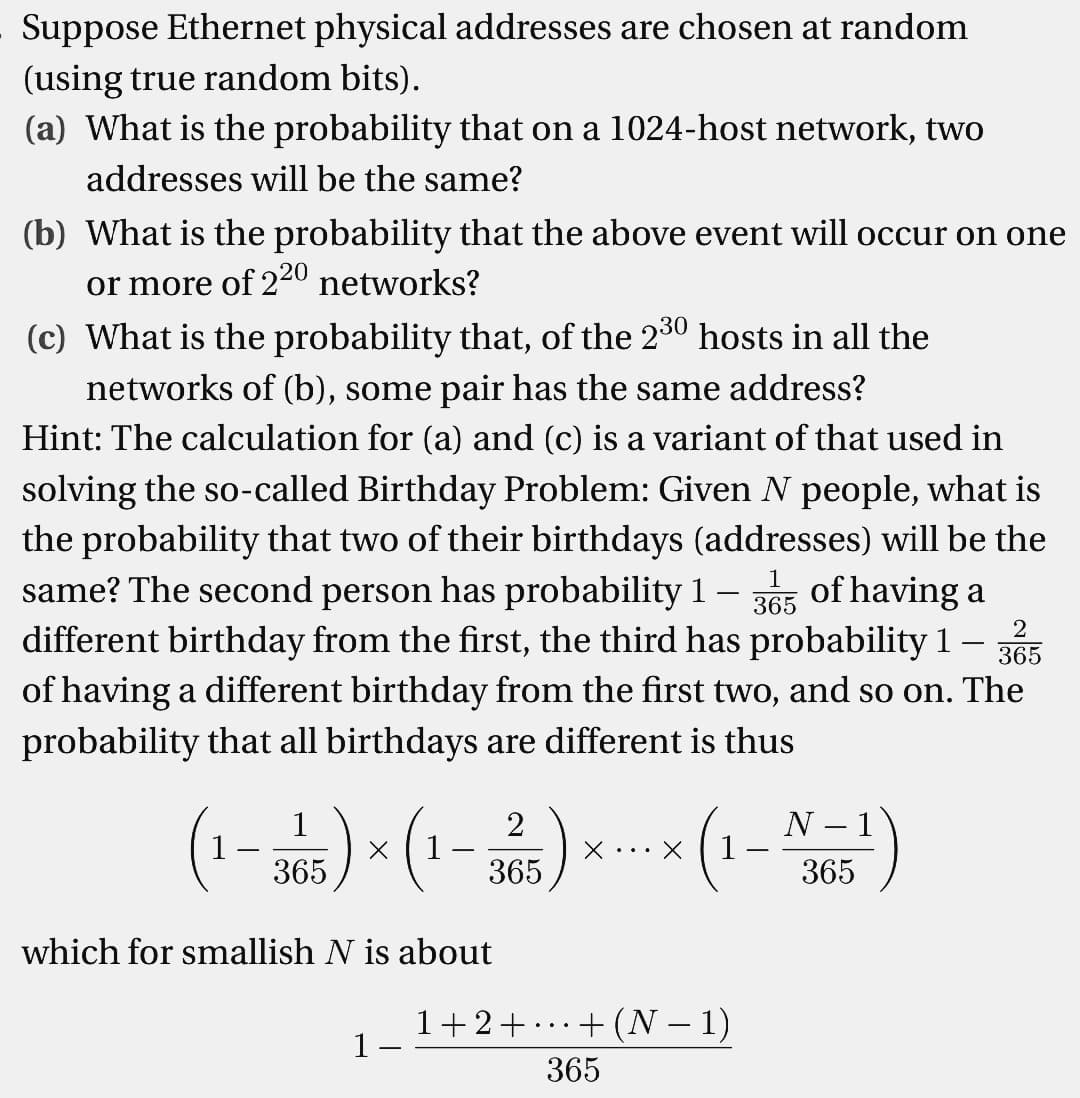(a) What is the probability that on a 1024-host network, two addresses will be the same? (b) What is the probability that the above event will occur on one or more of 220 networks? (c) What is the probability that, of the 230 hosts in all the networks of (b). some pair has the same address?
(a) What is the probability that on a 1024-host network, two addresses will be the same? (b) What is the probability that the above event will occur on one or more of 220 networks? (c) What is the probability that, of the 230 hosts in all the networks of (b). some pair has the same address?
Computer Networking: A Top-Down Approach (7th Edition)
7th Edition
ISBN:9780133594140
Author:James Kurose, Keith Ross
Publisher:James Kurose, Keith Ross
Chapter1: Computer Networks And The Internet
Section: Chapter Questions
Problem R1RQ: What is the difference between a host and an end system? List several different types of end...
Related questions
Question

Transcribed Image Text:Suppose Ethernet physical addresses are chosen at random
(using true random bits).
(a) What is the probability that on a 1024-host network, two
addresses will be the same?
(b) What is the probability that the above event will occur on one
or more of 220 networks?
(c) What is the probability that, of the 230 hosts in all the
networks of (b), some pair has the same address?
Hint: The calculation for (a) and (c) is a variant of that used in
solving the so-called Birthday Problem: Given N people, what is
the probability that two of their birthdays (addresses) will be the
same? The second person has probability 1-3 of having a
365
different birthday from the first, the third has probability 1 365
of having a different birthday from the first two, and so on. The
probability that all birthdays are different is thus
2
(1-365)×(1-325) × × (1-N5¹)
X X
365
which for smallish N is about
1+2+
1
· + (N − 1)
365
...
Expert Solution
This question has been solved!
Explore an expertly crafted, step-by-step solution for a thorough understanding of key concepts.
Step by step
Solved in 2 steps with 2 images

Recommended textbooks for you

Computer Networking: A Top-Down Approach (7th Edi…
Computer Engineering
ISBN:
9780133594140
Author:
James Kurose, Keith Ross
Publisher:
PEARSON

Computer Organization and Design MIPS Edition, Fi…
Computer Engineering
ISBN:
9780124077263
Author:
David A. Patterson, John L. Hennessy
Publisher:
Elsevier Science

Network+ Guide to Networks (MindTap Course List)
Computer Engineering
ISBN:
9781337569330
Author:
Jill West, Tamara Dean, Jean Andrews
Publisher:
Cengage Learning

Computer Networking: A Top-Down Approach (7th Edi…
Computer Engineering
ISBN:
9780133594140
Author:
James Kurose, Keith Ross
Publisher:
PEARSON

Computer Organization and Design MIPS Edition, Fi…
Computer Engineering
ISBN:
9780124077263
Author:
David A. Patterson, John L. Hennessy
Publisher:
Elsevier Science

Network+ Guide to Networks (MindTap Course List)
Computer Engineering
ISBN:
9781337569330
Author:
Jill West, Tamara Dean, Jean Andrews
Publisher:
Cengage Learning

Concepts of Database Management
Computer Engineering
ISBN:
9781337093422
Author:
Joy L. Starks, Philip J. Pratt, Mary Z. Last
Publisher:
Cengage Learning

Prelude to Programming
Computer Engineering
ISBN:
9780133750423
Author:
VENIT, Stewart
Publisher:
Pearson Education

Sc Business Data Communications and Networking, T…
Computer Engineering
ISBN:
9781119368830
Author:
FITZGERALD
Publisher:
WILEY